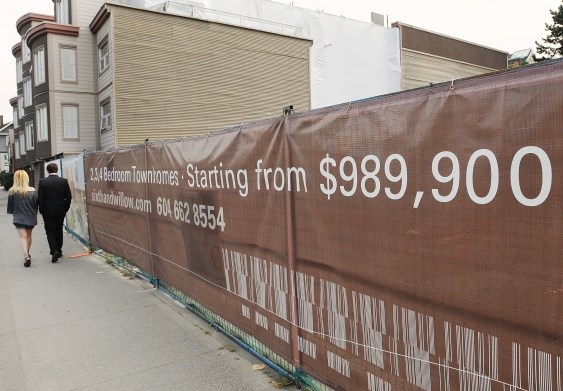The question is one Vision Vancouver Coun. Geoff Meggs hears a lot: Is it time to declare that the future of housing for most people in the city will be rental?
It’s a depressing thought for residents bent on home ownership.
For others, renting in Vancouver for life is not an issue — it’s whether the housing will be available, decent and affordable.
Meggs’ question opened up discussion at a public forum Monday night hosted by Vision Vancouver at the WISE Hall.
“If we want to change the culture so that this becomes a city where people have expectations that they’ll rent for life — bring it on,” said panelist Lyndsay Poaps, a former park board commissioner who rents part of an East Side duplex with her family.
What Poaps has learned and the city’s housing numbers reveal is that Vancouver has a shortage of decent, affordable rental housing. Vacancy rates are chronically low, averaging 0.9% over the past 30 years.
That’s because the majority of the city’s purpose-built rental stock was constructed in the 1960s and 1970s. And since then, as Meggs pointed out, tenants have faced “renovictions” from their rental homes and Vancouver has become the most expensive housing market in Canada and the second least affordable city in the world.
A common complaint shared by Meggs, Poaps and panelists Jim O’Dea, a housing consultant, and Yuri Artibise, the vice-president of the Co-operative Housing Federation of BC, is the provincial and federal governments are not building enough affordable housing.
O’Dea urged senior levels of government to take advantage of low interest rates and invest in more housing. Without that commitment, he said, the absence of housing makes for a dire situation among people who don’t have money to pay high rents.
Artibise, who lives in a co-op at Olympic Village, is worried about a bleak future for tenants of co-ops with more than 3,000 BC households facing the loss of rental assistance by 2020 when the Federal Co-operative Housing Program shuts down.
Meggs outlined some of the city’s efforts to assist renters, including a rent bank, a database that tracks violations of rental buildings and programs to encourage developers to build rental housing.
Meggs said the number of new rental units under the Short Term Incentives for Rental Housing program, or STIR, has gone from zero in 2008 to 1,000 in 2012 and another 1,000 in 2013.
Additionally, the city has seen a surge in new laneway homes and an increase in secondary suites. More than 350 units are to be developed on four city properties and the city is working on creating a housing authority with the goal of building affordable housing on city land.
“I am personally very proud of the work we have done in this area but I’m very, very painfully aware that it’s inadequate,” he said.
Poaps, who has worked for Toronto’s Affordable Housing Office and was a member of the Mayor’s Engaged City Task Force, said her biggest hope is Vancouver can one day become “a city for all,” where there is a mix of affordable homes.
“My biggest fear is that the residents alone can’t do it, that we’ve missed the boat and this is turning into an executive city. It’s the hollowing out of all the things I love about Vancouver.”
- Courtesy of Vancouver Courier



